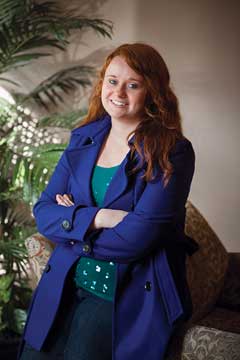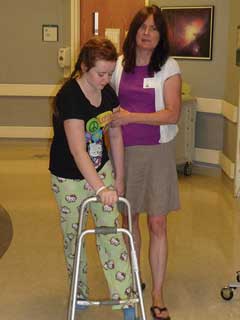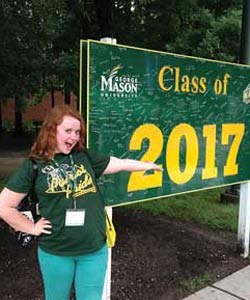 CHKD’s mailroom receives almost 10,000 pieces of mail each week – most are the typical sort associated with operating a hospital. But this summer, a hand-addressed letter arrived. And we can’t resist sharing it.
CHKD’s mailroom receives almost 10,000 pieces of mail each week – most are the typical sort associated with operating a hospital. But this summer, a hand-addressed letter arrived. And we can’t resist sharing it.
In August of 2009, 14-year-old Grace Blackburn was preparing for her freshman year of high school. But a fall from her skateboard that crashed her head on the street changed her course in an instant. Her friends ran for help. Her father, David, arrived on the scene just as an ambulance pulled up. Grace was unconscious, having seizures and bleeding from the back of the head.
After being taken to a local hospital, the Williamsburg teen was transported to Norfolk by helicopter and admitted into CHKD’s pediatric intensive care unit. Grace had suffered a traumatic brain injury. She was put into a medically induced coma while a team of specialists, including pediatric neurosurgeons, carefully monitored her condition. As she slowly regained consciousness, it was clear–Grace had a long road of recovery ahead of her.
“You looked into her eyes, and she wasn’t really there,” David recalls. A fractured skull and a subdural hematoma left her confused and paralyzed on her left side. She couldn’t remember the accident at all, and she behaved as though she were 10 years younger. “The hardest thing for the family was that we didn’t know how much of her we’d get back,” David says.
After a week in the PICU, Grace was moved to CHKD’s inpatient rehabilitation unit, where she began the arduous task of recovery.
“Rehabilitation after a brain injury is a delicate balance,” says Dr. Katrina Lesher, medical director of rehabilitative services at CHKD. “We need to allow the brain to rest and heal but at the same time allow appropriate stimulation to promote recovery. It’s a complex recovery process. Depending on which part of the brain is involved, patients can have deficits affecting their ability to walk, eat and communicate.”
 Grace worked daily with occupational and physical therapists to regain small motor skills and strength on her left side. “Children with brain injuries often have problems with memory, sequencing tasks and problem solving,” says Meghan Gwaltney, a CHKD speech-language pathologist who also worked with Grace using games designed to engage kids and achieve therapy goals. “Our patients are much more motivated when they’re having fun.”
Grace worked daily with occupational and physical therapists to regain small motor skills and strength on her left side. “Children with brain injuries often have problems with memory, sequencing tasks and problem solving,” says Meghan Gwaltney, a CHKD speech-language pathologist who also worked with Grace using games designed to engage kids and achieve therapy goals. “Our patients are much more motivated when they’re having fun.”
After a month at CHKD, Grace was able to walk out of the hospital on her own. “Such a huge team of doctors, nurses and therapists gave their all to our child,” says Grace’s mom, Amy. “This amazing group of heroes gave us our child back, and we are eternally grateful. “
Four years later, at another turning point in her life, Grace wrote us the following note, reflecting on the impact CHKD had on her life and the lessons she takes with her as she begins a new chapter.
Dr. Lesher practices with Children’s Specialty Group, PLLC, at CHKD.
Read Grace's Letter to CHKD
Dear CHKD,
You all probably don’t remember me, but I was a patient at CHKD four years ago. I was admitted for a month as I recovered from a traumatic brain injury that I suffered after falling off my skateboard and hitting my head.
I’m writing this letter to thank all of you for the tremendous effort you put into helping me get better.
When I was first admitted, I was paralyzed on the left side of my body. I was unable to walk, write or feed myself. I was also suffering from severe cognitive impairments which affected my memory and my ability to behave appropriately for my age.
 Though I don’t remember most of my hospital stay, I’m told I was rather unpleasant to all those around me – belligerent, frustrated and irate. I found it difficult to cope with my suddenly and dramatically diminished capabilities and refused to cooperate with those who were trying to help me.
Though I don’t remember most of my hospital stay, I’m told I was rather unpleasant to all those around me – belligerent, frustrated and irate. I found it difficult to cope with my suddenly and dramatically diminished capabilities and refused to cooperate with those who were trying to help me.
Still, you all persevered – coaxing me daily into doing my physical, occupational and speech therapies. And thanks to your efforts, each day I got a little bit stronger, until I was once more able to walk independently, to use my hands freely, to reclaim my mind as my own and I was finally ready to go home.
My release from the hospital was a big defining moment in my life, and now I find myself at another period of significance – I’ve recently graduated from high school, and I will be leaving home in two weeks to attend George Mason University. My acceptance to college was made possible by the good grades I made in high school. And my ability to make good grades was made possible in large part by your staff’s tireless efforts to restore me to a healthy, able body and mind.
You all do the most important work anyone could ever hope to accomplish – never forget that. Were it not for the dedication you all extended to facilitate my recovery, I would never have been able to accomplish the things I’ve already accomplished nor would I have the means to strive for the many things I hope to achieve in the future.
Any success I have come by, past, present or future, I must attribute to you. You instilled in me the ability to try whenever I can, fight whenever I must and always believe in myself. Your ceaseless determination in helping to restore my health has taught me that I can do absolutely anything I put my mind to. You all have given me a second chance at life, and for that I will be forever grateful.
Sincerely yours,
Grace Blackburn